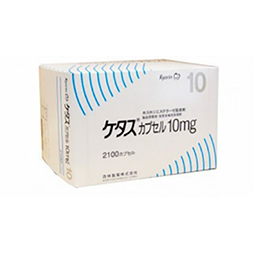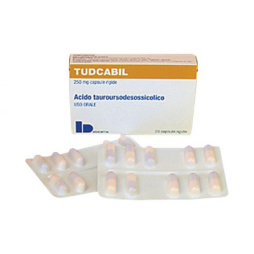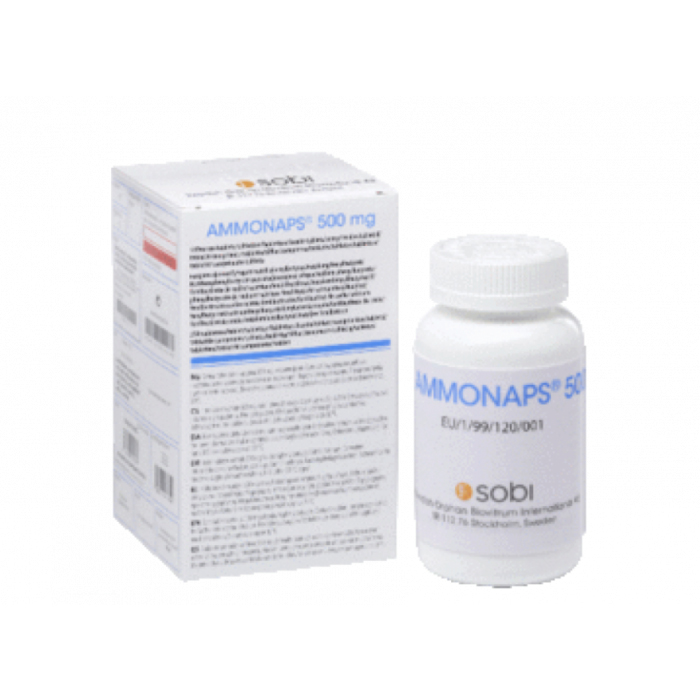Medicine access. Made simple.
We guide you through the process of safely and legally accessing a new ALS medicine that is not available in the United States.
How can I legally access a non-FDA approved medicine?
We’ve shipped hundreds of medicines to patients in the United States and we’re here to support you in safely and legally accessing your medicine. You can legally access a medicine for personal use under the FDA’s Personal Importation Policy (PIP).
See new ALS medicines belowWhat are the latest Amyotrophic lateral sclerosis related treatments that I can access in the United States?
Some medicines that ALS patients buy with us might currently not be approved for ALS but for other indications. The patient's treating doctor is allowed to prescribe off-label medicines for their patient.

Ketas (ibudilast)
Ketas (ibudilast) is a medication used for the treatment of bronchial asthma and for cerebrovascular (brain and blood vessel) disorders.
Read about approvals and clinical trials
Where has Ketas (ibudilast) been approved?
Ketas (ibudilast) was approved for the treatment of patients with bronchial asthma and cerebrovascular disorders by: Pharmaceuticals and Medical Devices Agency (PMDA), Japan, May 1989.
Ibudilast was granted orphan drug designation for the treatment of amyotrophic lateral sclerosis (ALS) by the European Medical Agency (EMA), European Union, on December 12, 2016 and by the Food and Drug Administration (FDA), USA, on June 10, 2016. Note: This means the medicine has not been approved by the EMA or the FDA but due to the seriousness of the condition, the lack of alternatives for diagnosis, prevention or treatment or the rarity of the condition, the medicine is treated with special care by the regulatory agencies.
Clinical trials
Cerebrovascular disorders
The Pharmaceuticals and Medical Devices Agency (PMDA), Japan, approvals of Ketas (ibudilast) for cerebrovascular disorders, in particular improvement of dizziness for patients with sequelae of cerebral infarction, was based on a double-blind clinical study
In this study, this product or a placebo was given to patients for 8 weeks after an initial observation period of 4 weeks. During the observation period, placebo was given and patients with poor compliance or who didn’t have any symptoms were removed from the study.
Results
The main outcome measured was improvement of dizziness. Ketas (ibudilast) saw better results than placebo within the measured outcome. The improvement rate of dizziness was:
- 50.0% (47/94) for Ibudilast
- 18.7% (20/107) for placebo
Bronchial asthma
The Pharmaceuticals and Medical Devices Agency (PMDA), Japan, approvals of Ketas (ibudilast) for bronchial asthma was based on clinical studies including a double-blind study.
Results
The efficacy outcome measured was improvement rate: from moderate to marked, and slight to marked. The double-blind clinical study demonstrated that Ketas (ibudilast) is effective to treat bronchial asthma. The improvement rate (%) was:
Total
- 41.4% moderate to marked
- 73.4% slight to marked
ALS
The effects of ibudilast on ALS patients have been evaluated in experimental models. Clinical trials were ongoing at the time the orphan designation was granted.
References:
Summary of Product Characteristics [PMDA]: Ketas (ibudilast) [PDF], Kyorin Pharmaceutical Co, Ltd, May 2013.
EMA Orphan Designation: ibudilast. www.EMA.europa.eu, 12/12/2016.
Orphan Designation: ibudilast. www.accessdata.fda.gov, 10/06/2016.
Orphan Designation, www.ema.europa.eu, cited on 15/06/2018.
Designating an Orphan Drug, www.fda.gov, cited on 15/06/2018.

Tudcabil (tauroursodeoxycholic acid)
Tudcabil (tauroursodeoxycholic acid) is a medication granted orphan designation by the EMA for amyotrophic lateral sclerosis (ALS).
Read about indications and approvals
What is Tudcabil (tauroursodeoxycholic acid)?
Tudcabil (tauroursodeoxycholic acid) is a compound originally approved to treat liver diseases, although research suggests it may have a broader application which includes the treatment of amyotrophic lateral sclerosis (ALS). Tauroursodeoxycholic acid is a bile acid taurine conjugate derived from ursodeoxycholic acid. Bile acid is made by the liver and stored in the gallbladder and helps with digestion. It has a role as a human metabolite, an anti-inflammatory agent, a neuroprotective agent, an apoptosis inhibitor, a cardioprotective agent and a bone density conservation agent.
Where has Tudcabil (tauroursodeoxycholic acid) been approved?
Tudcabil (tauroursodeoxycholic acid) is approved in Italy for the treatment of liver diseases. Tudcabil (tauroursodeoxycholic acid) is not approved for amyotrophic lateral sclerosis (ALS), but was granted orphan designation for ALS by the European Medicines Agency (EMA) (EU, February 2017).
References:
Public summary of opinion on orphan designation [EMA]: Tudcabil (tauroursodeoxycholic acid) [PDF], Bruschettini s.r.l., cited on March 2017.
Atto Completo [Italy Ministry of Health]: Tudcabil (tauroursodeoxycholic acid), cited on November 2003.

Tonil (clenbuterol)
Tonil (clenbuterol) is a medication used for the treatment of people with bronchial asthma, chronic bronchitis, emphysema, acute bronchitis, or stress urinary incontinence. Neurologists sometimes prescribe Tonil (clenbuterol) for off-label treatment of people suffering from ALS.
Read about approvals and clinical trials
Where has Tonil (clenbuterol) been approved?
Tonil (clenbuterol) was approved to treat patients with bronchial asthma, chronic bronchitis, emphysema, acute bronchitis, or stress urinary incontinence by: The Pharmaceutical and Medical Devices Agency (PMDA), Japan
Please note that this medicine may have also been approved in other regions than the ones we’ve listed. If you have a question about its approval in a specific country feel free to contact our support team.
Clinical trials
Breathing disorders
The efficacy of Tonil (clenbuterol) has been studied in a clinical trial that involved 19 patients with bronchial asthma with reversible airway obstruction. Patients were treated with either 40 mcg clenbuterol or placebo.
Results
The main efficacy outcome was lung function. Lungs of patients treated with clenbuterol showed more bronchodilation. Side effects of the medicine were minimal.
Amyotrophic lateral sclerosis (ALS)
The effects of clenbuterol on muscle function have been studied in various clinical trials.
Note: Tonil (clenbuterol) has not yet been approved for treatment of ALS. Neurologists sometimes prescribe Tonil (clenbuterol) for off-label treatment of people suffering from ALS.
A trial (study A) that involved 20 healthy participants studied the effects of clenbuterol on muscle strength before and after knee surgery. Participants were given either clenbuterol of placebo for 4 weeks.
Another trial (study B) that involved 14 ALS patients that were already being treated with riluzole, studied the safety and efficacy of clenbuterol. Patients were given 20 mcg of clenbuterol three times a day for six months.
Results
The main efficacy outcomes of study A were recovery rate of the operated leg (how fast the leg recovered) and muscle strength of their unoperated leg. The researchers suggested that clenbuterol has therapeutic potential in the treatment of muscle-wasting conditions.
The operated leg in participants receiving clenbuterol treatment recovered faster. The knee muscle of the unoperated leg of these patients showed increased strength after 6 weeks. However, in terms of absolute strength the differences were not significant between the two groups.
For study B, the main efficacy outcomes were Myometer and medical research center (MRC) scores for the upper and lower limbs, which are scales used to measure muscle strength of body parts. Another outcome was the mean forced vital capacity (FVC), a measure of lung function.
Clenbuterol improved the Myometer score significantly, both for the upper limbs (20% at 3 months and 23% at 6 months) as well as for the lower limbs (22% at 3 months and 27% at 6 months). The MRC score showed a trend toward improvement, but this was not statistically significant. The FVC score trended toward improvement at 3 months (5%) and was significant at 6 months (10%).
Despite these improvements, the ALS-Functional Rating Scale score showed no change after 3 or 6 months.
A currently ongoing clinical trial studies the safety and tolerability of clenbuterol (taken by mouth) in ALS patients. The trial also evaluates the effects of clenbuterol treatment on motor function.
References:
A Trial of Clenbuterol in Bronchial Asthma, Anderson G, Thorax, 1977
Clenbuterol, a β-Adrenoceptor Agonist, Increases Relative Muscle Strength in Orthopaedic Patients, Maltin CA, Clin Sci (Lond), 1993
A pilot trial with clenbuterol in amyotrophic lateral sclerosis, Sorarù G, Journal of Amyotrophic Lateral Sclerosis, Jul 2009
Review: β2-Adrenoceptor agonists as novel, safe and potentially effective therapies for Amyotrophic lateral sclerosis (ALS), Bartus RT, Neurobiology of Disease, January 2016
Clenbuterol on Motor Function in Individuals With Amyotrophic Lateral Sclerosis, Clinical Trial NCT04245709, cited on Oct 21, 2020

Ammonaps (sodium phenylbutyrate)
Ammonaps (sodium phenylbutyrate) is a medication used for the treatment of patients who have urea cycle disorders. Neurologists sometimes prescribe Ammonaps for off-label treatment of people suffering from ALS.
Read about approvals and clinical trials
Where has Ammonaps (sodium phenylbutyrate) been approved?
Ammonaps (sodium phenylbutyrate) was approved to treat urea cycle disorders involving deficiencies by: The Food and Drug Administration (FDA), USA, on May 13, 1995, under the brand name Buphenyl; the European Medicines Agency (EMA), Europe, on Dec 8, 1999; The Therapeutic Goods Administration (TGA), Australia, on May 19, 2017, under the brand name Pheburane.
Please note that this medicine may have also been approved in other regions than the ones we’ve listed. If you have a question about its approval in a specific country feel free to contact our support team.
Clinical trials
Urea cycle disorders
The Food and Drugs Administration (FDA) and the European Medicines Agency (EMA) approvals of Ammonaps (sodium phenylbutyrate) were based on data of a clinical trial that involved 82 patients with urea cycle disorders who were treated with sodium phenylbutyrate. Patients had not received other treatments for their disease before.
Results
The main efficacy outcome was patient survival. The study also measured the number of hyperammonaemic episodes (periods of very high blood ammonia levels), cognitive development (development of the ability to think, learn and remember), growth, and blood ammonia and glutamine levels.
Amyotrophic lateral sclerosis (ALS)
The effects of clenbuterol on muscle function have been studied in various clinical trials.
Note: sodium phenylbutyrate has not yet been approved for treatment of ALS. Neurologists sometimes prescribe Ammonaps for off-label treatment of people suffering from ALS.
A phase 2 trial (NCT00107770), that involved 40 ALS patients, studied the safety of sodium phenylbutyrate. Patients received sodium phenylbutyrate for 20 weeks.
The phase 2 CENTAUR trial (NCT03127514) studied the efficacy of sodium phenylbutyrate (PB) combined with taurursodiol (TUDCA). In the trial, 89 participants were randomly assigned to receive 3g PB and 1g TUDCA twice daily for 24 weeks, while 48 participants received a placebo.[3] Most participants (77%) of the trial were receiving an approved ALS therapy (riluzole, edaravone, or both) during and/or before starting the trial.
90 patients of the CENTAUR study participated its open‐label extension study to receive PB/TUDCA for up to 30 months
Results
The main outcome measure of the phase 2 trial was tolerability.[2] The study showed that sodium phenylbutyrate was well tolerated.
The main efficacy outcome of the CENTAUR study was ALS Functional Rating Scale (ALSFRS-R) score (which ranges from 0 to 48, with higher scores indicating better function).[3] Results showed that PB/TUDCA treatment has both functional and survival benefits in ALS compared to placebo.
Patients who received the placebo declined by ±1.66 points per month. Patients receiving PB/TUDCA, declined by 1.24 points (a difference of 0.42 points or a 25% slowing of the progression rate). After 24 weeks of treatment, the absolute mean difference ALSFRS-R between treatment groups was 2.3 points.[4] Analyses showed that the treatment effect was independent of whether a patient was also treated with approved ALS therapies during and/or before starting the trial
Clenbuterol improved the Myometer score significantly, both for the upper limbs (20% at 3 months and 23% at 6 months) as well as for the lower limbs (22% at 3 months and 27% at 6 months). The MRC score showed a trend toward improvement, but this was not statistically significant. The FVC score trended toward improvement at 3 months (5%) and was significant at 6 months (10%).
Results of the open-label extension showed that participants receiving PB/TUDCA lived significantly longer than those on placebo (25 months vs. 18.5 months or a 44% lower risk of death). After 2 years, ±51.6% of the patients receiving PB/TUDCA were still alive, compared to 33.9% of those in the placebo group.
Please refer to the summary of product characteristics below and in the resource section for comprehensive information about the safety and effectiveness of Ammonaps (sodium phenylbutyrate) for the approved indication.
References:
Ammonaps (sodium phenylbutyrate), EMA product overview, cited on Oct 16, 2020
Safety Study of Oral Sodium Phenylbutyrate in Subjects With ALS (Amyotrophic Lateral Sclerosis), Clinical trial NCT00107770, cited on Oct 20, 2020
AMX0035 in Patients With Amyotrophic Lateral Sclerosis (ALS) (CENTAUR), Clinical trial CENTAUR (NCT03127514), cited on Oct 20, 2020
Trial of Sodium Phenylbutyrate–Taurursodiol for Amyotrophic Lateral Sclerosis, Paganoni S., NEJM, Sept 3, 2020
Long‐Term Survival of Participants in the CENTAUR Trial of Sodium Phenylbutyrate‐Taurursodiol in ALS, Paganoni S., Muscle & Nerve, Oct 16, 2020
Phase 2 study of sodium phenylbutyrate in ALS, Cudkowicz M., Amyotroph Lateral Scler., Apr 2009
Get in touch to enquire about these ALS treatments
Contact usWhat doctors say about us


The team of everyone.org is wonderful with my patients. Their experts always respond very fast and are a valuable source of information and help for me and my patients. No one else in the US is capable of making unapproved medicines available to my patients.
Professor Neil A. Shneider, MD
Director of the Eleanor and Lou Gehrig ALS-Center USA


I have long been a fan of everyone.org and referred many patients with ALS to them over the years. Keep up the great work you are doing, everyone.org-team!
Dr. Richard S. Bedlack Jr. M.D, Ph.D.
Duke University ALS Center






